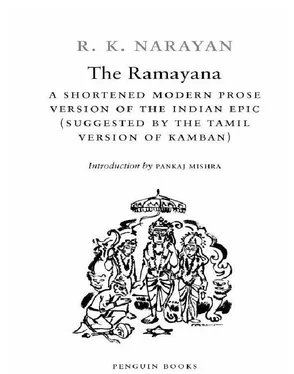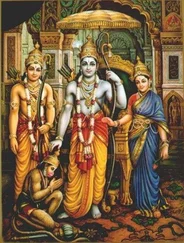Махариши Вальмики - The Ramayana
Здесь есть возможность читать онлайн «Махариши Вальмики - The Ramayana» весь текст электронной книги совершенно бесплатно (целиком полную версию без сокращений). В некоторых случаях можно слушать аудио, скачать через торрент в формате fb2 и присутствует краткое содержание. Жанр: Старинная литература, на английском языке. Описание произведения, (предисловие) а так же отзывы посетителей доступны на портале библиотеки ЛибКат.
- Название:The Ramayana
- Автор:
- Жанр:
- Год:неизвестен
- ISBN:нет данных
- Рейтинг книги:3 / 5. Голосов: 1
-
Избранное:Добавить в избранное
- Отзывы:
-
Ваша оценка:
- 60
- 1
- 2
- 3
- 4
- 5
The Ramayana: краткое содержание, описание и аннотация
Предлагаем к чтению аннотацию, описание, краткое содержание или предисловие (зависит от того, что написал сам автор книги «The Ramayana»). Если вы не нашли необходимую информацию о книге — напишите в комментариях, мы постараемся отыскать её.
The Ramayana — читать онлайн бесплатно полную книгу (весь текст) целиком
Ниже представлен текст книги, разбитый по страницам. Система сохранения места последней прочитанной страницы, позволяет с удобством читать онлайн бесплатно книгу «The Ramayana», без необходимости каждый раз заново искать на чём Вы остановились. Поставьте закладку, и сможете в любой момент перейти на страницу, на которой закончили чтение.
Интервал:
Закладка:
The sun began to move southward. Dark clouds, heavily laden, floated along, frequently eclipsing the sun, gradually massing themselves like an army of gigantic elephants; thunders rumbled and roared, lightning lit up the sky and the earth end to end. Storm shook the trees, ripped off their foliage, and scattered it in the air; scoured the earth and sprayed up mud and dust. Just as we felt the total heat and aridity where Thataka used to roam, now we must feel under our skin the dampness, the dimness, and the apparent lifelessness of the rainy days.
All through the months, the rains poured, waters running, rushing, and stagnating in pools, and sometimes carrying down boulders or the portion of a mountainside. Cuckoos and nightingales were silent. Peacocks were unseen. Other creatures of the forest were incarcerated in stony recesses and caves. No animal stirred out. No movement. Every kind of life seemed to have become paralysed. Wild and uncouth vegetation overran the landscape in a variety of monstrous creepers and vines. The sky was perpetually overcast. Winds blew cold and damp and drenched one’s surroundings and person. For a few days, the change of season was fascinating, but, in course of time, the persistent gloom and wetness proved depressing.
Rama, isolated in this climate, became subject to long periods of melancholy. The surrounding conditions made his inner turmoil more acute. He now felt hopelessly cut off from his wife and no action to seek her ever seemed possible. He felt thwarted and desolate. He began to feel guilty; he thought he was being too complacent. “While I live sheltered here, I cannot imagine what misery she might be facing.” When he saw foaming, frothing, reddish floodwater rushing down the mountain, bearing and rolling along uprooted trees, he was reminded of Sita being carried off. It created a hopeless ache in his heart and he said to himself, “There is no meaning in my continuing to live.” When he saw streaks of lightning splitting the sky, he pictured them as the monstrous fangs of asuras grinning and menacing him on all sides, and he pleaded, “Just when one of your clan has taken away the very core of my life, you want to take more? Nothing more is left.” When he saw an occasional deer emerge from its shelter when the downpour slackened a little, he addressed it, “You were jealous of Janaki; she was your rival in the grace of her movements. Now are you not pleased that she is no longer here? One of your kind drew me away from her. Now what is your purpose in strutting before me?” When he saw a slender streak of lightning edging a cloud, he sighed, “Why should you remind me of Sita’s figure and vanish again? When you rumble, does it signify your determination to restore Sita to me?” Then he addressed the god of love, Manmatha: “You are a tormentor. I feel scorched, and while I seek something to heal me, your darts stab again and again the same sore spot at my heart—merciless god! It is your good fortune that you are unseen, which saves you; my brother would have eliminated you, if he had seen how you torture me. Do you know what happened to Soorpanaka?”
Lakshmana noticed Rama’s state of mind and felt it was time for him to comfort him. He said, “Are you worried that the rainy days are prolonged? Are you worried that the asuras might prove invincible? Do you fear that Janaki may not be traced at all? Please don’t let your mind weaken. Anjaneya is there, Angada and all the other stalwarts will be our helpers. Soon we will see the skies bright and clear. Time has been passing, and we will soon see the promised armies, and with ease they will bring Janaki to your side. You had assured the sages of Dandaka forest that you would eradicate the asuras from their midst and that has been your chief mission here. Muster your strength and fulfill your mission. Don’t let your spirit droop.” Rama was comforted by such words, and they sustained him through a second bout of rain which suddenly started after a brief interval of clear weather.
The rains ended at last. The skies cleared. New leaves appeared on the trees; jasmine and other fragrant flowers bloomed. With brighter surroundings, Rama’s spirit also quickened. Now he could move out of his ashram and act positively.
With the end of the rainy season, nature’s traffic resumed on land, air, and water. Flocks of swans crossed the sky; cranes and aquatic birds flew by; a variety of fishes newly spawned darted under the water surfaces. Lotus was in bloom; frogs which had croaked themselves hoarse in unison all through the wet days now were silent. Peacocks came out into the sun shaking off clogging droplets of water and fanning out their tails brilliantly. Rivers which had roared and overflowed now retraced their modest courses and tamely ended in the sea. Areca palms ripened their fruits in golden bunches; crocodiles emerged from the depths crawling over rocks to bask in the sun; snails vanished under slush, and crabs slipped back under ground; that rare creeper known as vanji suddenly burst into bloom with chattering parrots perched on its slender branches.
All this was minutely noted by Rama, as indicating a definite change of season and a reminder that Sugreeva had failed to keep his promise to arrive with his army. He said to Lakshmana, “Does it not seem that Sugreeva has exceeded the four months’ limit? Do you think he is asleep? With our help, he has acquired a mighty kingdom to rule, but he has forgotten us. One who has snapped all ties of friendship, swerved from truth, and acted false, deserves to be taught a lesson, and if he is killed in the process, we could not be blamed; but first of all will you go and find out why he has defaulted, what has happened to him, and if he deserves to be punished? You will tell him that destroying evil is like destroying a poisonous insect and we will not be violating any code of conduct thereby. You will explain with due clarity and impress it on the mind of one who does not seem to have known proper conduct either at five years of age or at fifty. Tell him that if he wishes to flourish as a ruler of this Kiskinda in the midst of his kinsmen and people, he must first come up immediately with all the help he can muster to search for Sita. If he does not, we will not hesitate to destroy every monkey in this world, so that that tribe will become unknown to future generations. In case he has found someone stronger than Rama or Lakshmana as his supporters, remind him that we could meet any challenge from anywhere.” After relieving his mood and temper with these words, Rama probably felt that he had gone too far and might provoke Lakshmana to act violently. So he told him now, “Speak gently. Do not show your anger but let your explanations be firm and clear. If he does not accept the moral you indicate, do not lose your patience but give a careful hearing to whatever he may have to say and bring me his reply.”
Properly armed, Lakshmana left immediately. He was overwhelmed with the seriousness of his mission, and his mind was fixed on reaching his destination in the shortest time possible. He moved swiftly, looking neither to his left nor right. He avoided a familiar path leading to Kiskinda, the old pathway trodden by them when Sugreeva went forth to encounter Vali. Now Lakshmana, feeling uncertain about their relationship with Sugreeva, chose a different route. It was also a measure of precaution as he did not wish to be observed by Sugreeva’s spies. He reached Kiskinda leaping along from crag to crag.
Observers at the outpost went to Angada with the news of Lakshmana’s arrival. Angada hastened out to meet him, but even from a distance understood what temper he was in, and withdrew quietly; he rushed to Sugreeva’s palace, which had been designed and built by a master architect and was so gorgeous and comfortable that Sugreeva hardly ever left it. His bed chamber was strewn with flowers, and he lay surrounded by beauties with long tresses and heavy breasts, who provided his comforts, and sang and entertained him. The company of beautiful women, with their dizzying perfumes and the scent of flowers and rare incense, and above all much wine imbibed, left him in a daze of ecstasy. Sugreeva lay inert, unmindful of the world outside; Angada softly entered, respectfully saluted his recumbent uncle, and whispered, “Listen to me, please. Rama’s brother Lakshmana is come; in his face I see anger and urgency. What is your command to me now?”
Читать дальшеИнтервал:
Закладка:
Похожие книги на «The Ramayana»
Представляем Вашему вниманию похожие книги на «The Ramayana» списком для выбора. Мы отобрали схожую по названию и смыслу литературу в надежде предоставить читателям больше вариантов отыскать новые, интересные, ещё непрочитанные произведения.
Обсуждение, отзывы о книге «The Ramayana» и просто собственные мнения читателей. Оставьте ваши комментарии, напишите, что Вы думаете о произведении, его смысле или главных героях. Укажите что конкретно понравилось, а что нет, и почему Вы так считаете.












